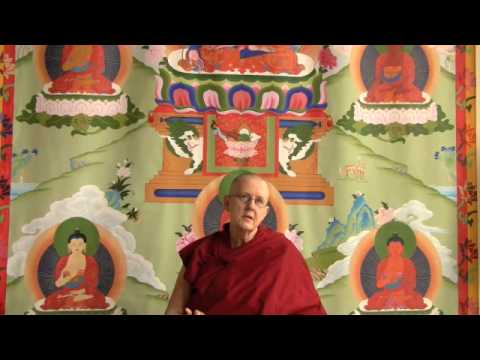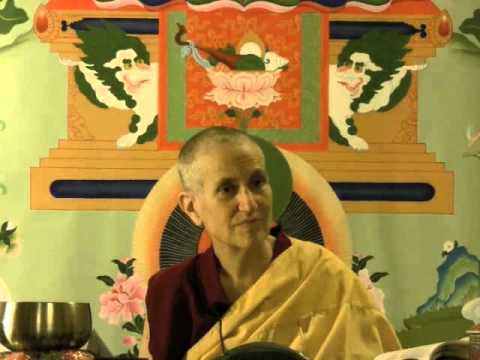Commentary on a request to Tara
Commentary on a request to Tara
Part of a series of Bodhisattva’s Breakfast Corner talks given during the Green Tara Winter Retreat from December 2009 to March 2010.
- Qualities of our teachers to aspire to
- We can remind ourselves throughout the day of the motivation we want to cultivate
Green Tara Retreat 045: Commentary on a request to Tara (download)
I have been reading Pabongka Rinpoche’s Liberation in the Palm of Your Hand. One of the things he says is that when you are teaching the Dharma, you must smile. Venerable does that very well. He says there was one Geshe who taught who didn’t smile. He just frowned and scolded his students. I suppose they got the Dharma teachings anyway.
There is, in the front-generation sadhana, where we make the request to Tara, “May every living being who merely hears, sees, remembers, touches, or talks to me immediately be purified of all of his or her problems and their causes. May they attain temporal happiness and ultimate happiness. May I be able to lead them to enlightenment.” That is what it says, “May every living being who merely hears, sees, remembers, touches or talks to me … ”
That is a big aspiration. Our dedication prayers in our Chenrezig sadhana have a similar verse, “May anyone who merely sees, hears, remembers, touches or talks to me be freed in that very instant from all suffering.”
I have being thinking about this for a long time. What kind of person, what kind of quality would you have to be, to be able to have that be true: that anyone who merely hears, sees, remembers, touches or talks to me be freed in that very instant from all their suffering? That is mind boggling.
In the course of my Dharma life, I have met, I think personally, two people that gave me a clue about this. One of them was one of Venerable Chodron’s teachers, Geshe Yeshe Tobden, of whom she talks about from time to time as being the monk who is so humble that he is always looking a little scruffy and his shamtab [lower robe] is a little sideways, and you would never know what an accomplished practitioner he was. He came to teach at the Dharma Friendship Foundation in Seattle—quite a few years ago. Because I was very new to the Dharma and his presence was such that just sitting near him, there was a feeling of such happiness and acceptance, or even just feeling his love. It wasn’t that he was smiling at students. He wasn’t that kind of person. He wasn’t outgoing; he wasn’t one of those jolly Tibetan teachers. He was pleasant, but very focused on what he was teaching. The quality of his energy was so pure, as was my interpretation, you could almost just weep to be near him.
I had the same experience when I heard Venerable Palden Gyatso speak, also in Seattle. He was the monk who was in prison [in Tibet] for I think 30 years, and had been tortured. When he spoke—I don’t remember the content of his talk now, but I do know that he spoke about his time in prison with such love and such compassion. He had that same energy. He was as far from me as I am from this camera. I could just hardly not weep to be near this man’s love and compassion. I think that has to be some of the quality. Now, His Holiness, whom I have never met personally, but I’ve been to hear him teach quite a few times with thousands of people. What I have noticed is that everybody gets happier the more the days of the teachings go by. It seems that everybody gets lighter and lighter and lighter, so that is the same quality. So, how do you get that?
A few weeks ago when Venerable Chodron was teaching Mind Training Like the Rays Of The Sun I think she gave us the key. It is from the birth stories, and it is, “Whether seeing, hearing, remembering, meeting or talking to them, always do whatever will be beneficial for sentient beings and will bring them peace.” And, of course, by “bringing them peace,” I am interpreting as meaning the peace of liberation and enlightenment; certainly maybe the peace of this moment as well. So, “Whether seeing, hearing, remembering, meeting or talking to them, always do whatever will be beneficial for sentient beings and will bring them peace.”
I have been practicing with that so have had it in my pocket for a few weeks. I’m just using that as a way of reminding myself throughout the day of the motivation that we are trying to maintain throughout our day: of harming no one, of being of benefit, of creating virtue and remembering bodhicitta. It is a beautiful little synopsis of how we can bring benefit to others. I am convinced that practicing that really is the cause for being able to be the kind of person for whom if anyone merely sees, hears, remembers, touches or talks to us they will immediately be freed from all suffering.
It takes a long time, but I wanted to re-emphasize that for the people who heard that teaching and to bring it to the attention of all the people who are practicing the Tara Retreat from Afar, and to those who aren’t listening to the Thursday night teachings. I think it is a very key piece to understanding how to do this practice.
Venerable Thubten Chonyi
Ven. Thubten Chonyi is a nun in the Tibetan Buddhist tradition. She has studied with Sravasti Abbey founder and abbess Ven. Thubten Chodron since 1996. She lives and trains at the Abbey, where she received novice ordination in 2008. She took full ordination at Fo Guang Shan in Taiwan in 2011. Ven. Chonyi regularly teaches Buddhism and meditation at the Unitarian Universalist Church of Spokane and, occasionally, in other locations as well.


